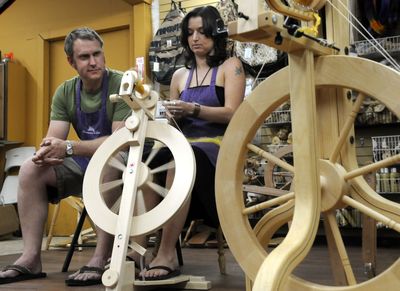Yarn business reveals softer side of success
Paradise Fibers ultimate shop for those who work with their hands

Pluckyfluff. Possum fiber. Baby camel down. Banana silk. Fiber arts enthusiasts scour the Internet looking for such items. Their searches often lead them to Paradise – Paradise Fibers, to be exact.
This eclectic Web site sells everything a knitter, weaver or spinner could imagine. For 14 years, the business has specialized in everyday items like knitting needles, as well as less common things like yarn made of 80 percent milk protein fiber and 20 percent cotton fiber.
Three years ago, the owners opened a brick-and-mortar store on North Thor Street. The road to Paradise lies directly behind an adult bookstore on Trent Avenue.
This family-owned-and- operated business is thriving despite, or perhaps because of, the economic downturn. “We’ve had growth every month. It’s not like we’re selling cars – it’s a recession-proof thing,” said Travis Romine. When asked his job title, he answered with a grin: “CEO or manager – it depends on the day.”
Romine and his girlfriend, Sara Garber, whom he dubbed the “spinstress,” handle the day-to-day operation of the business. His mother, Laurel Romine, contributes colorful hand-dyed rovings displayed along a shop wall, and his father, Bill Romine, is present every day.
“Our bread and butter is the online business,” Romine said. “We ship stuff all over the world.” However, the physical shop is rapidly becoming a destination store.
On a recent afternoon, several customers browsed through rows of yarn made from exotic fibers like yak and buffalo, and checked out traditional wool and cotton blends.
A doorway led to a room filled with spinning wheels of all sizes. It seemed to spring straight from the fairy tale Rumpelstiltskin. The wheels sat as if waiting to be used to spin straw into gold, or cashmere into yarn.
“There’s not a showroom of spinning wheels like this on the West Coast,” Romine said.
The wheels are made in New Zealand, Poland, Canada and the United States. Soon they will be made in Spokane.
“We’re currently going into production with our own wheel designed by Dad, the quirky inventor,” Romine said. “We’ve gotten rave reviews from the original prototype and are very excited about its release. The wheel will be manufactured here in Spokane for the most part, with a few odds and ends sourced to other U.S. companies.”
Weavers too can find all they need here. Another room contains looms of all sizes. Each month, Paradise Fibers offers a variety of classes.
“You can learn on one of these little looms and then transfer to a larger one,” explained Romine.
In addition to weavers’ workshops, the business hosts spinning and knitting classes. Those programs made a knitter out of Garber. She learned to knit after she started working at the store.
“I scheduled all the classes, and then I began taking them,” she said. “Right now, I’m making a lot of lace.”
And though she knows how to spin her own yarn, she still buys plenty from the store. “It’s addictive,” she said with a grin.
The classes have been quite successful. Last month, artist and author Lexi Boeger traveled from California to lead Camp Pluckyfluff. Enthusiasts from across the country flocked to the store.
“Pluckyfluff is handspun art yarn. A skein of yarn can almost be a stand-alone piece of art,” Garber explained.
Indeed, Paradise Fibers seems part art gallery, part craft shop, with rows of exquisitely colored yarn lining its walls like fiber rainbows. Though Romine said, “Diversity is a big part of our strength,” customers won’t find scrapbook supplies or rubber stamp accessories here. They will find everything needed to create the silkiest angora shawls or the softest buffalo fiber socks.
Those who want a true organic experience can buy everything but the sheep at Paradise Fibers. Raw wool and the supplies needed for carding, spinning and dyeing yarn are in stock. And for those who want to spin their own silk, the store offers silkworm cocoons – worms included.
“Kind of like tequila,” Romine said with a laugh.
The store focuses primarily on natural fibers, with very few synthetics offered. Customers can also find what they need to make natural dyes. Jars containing chamomile, marigold flowers and cochineal bugs fill a row of shelves.
“When you grind up the cochineal bugs it makes a bright red dye,” Garber said. “We’ll soon be offering natural dye classes.”
In keeping with the company’s commitment to sustainable living, Romine said, “We send a portion of our profits to Heifer International every year to help support wool farmers from around the world.”
They invest locally, too. This year the business plans to donate yarn to the Women’s Hearth in Spokane. The yarn will be used to knit wool blankets for the homeless.
At its genesis, Paradise Fibers was a high-tech online business, helping enthusiasts pursue old-time arts. The addition of a store with the space to host classes has enabled them to provide a gathering place for fiber artists.
Romine said he and his employees truly enjoy what they do. “We’re not making a million dollars here, but we are having fun.”